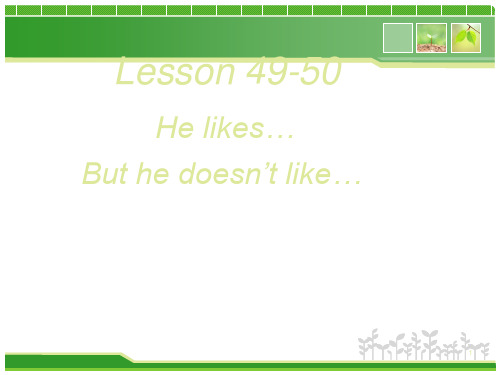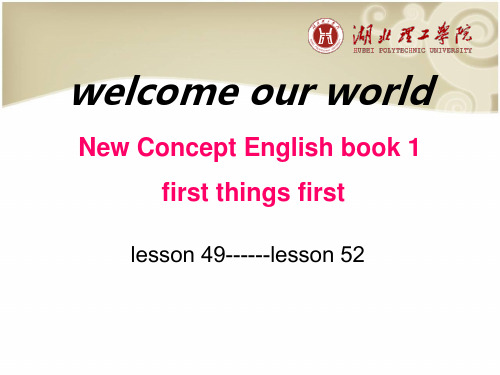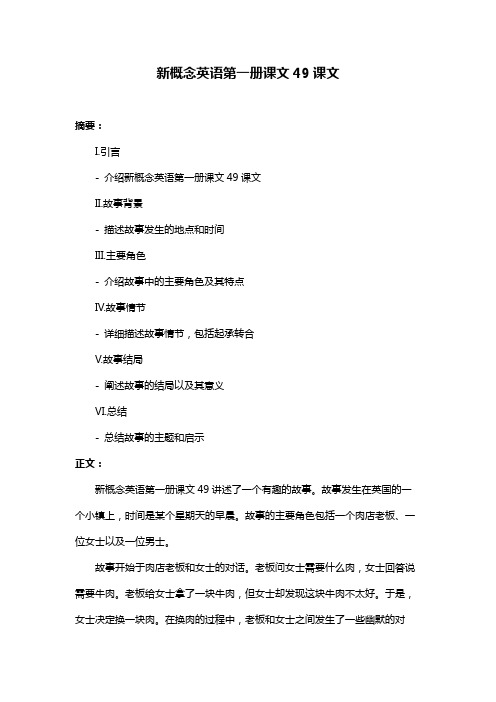新概念英语第一册L49(共52页)
新概念英语-第一册Lesson-49-50(共28张PPT)

Does Jason like fresh lettuces? Yes, he does. He likes lettuces, but he doesn’t want any.
8
Does Nick like whisky? Yes, he does. He likes whisky, but he doesn’t want any.
11
Does Miss Zhang like choice peaches?
Yes, she does.
She likes peaches,but choice peaches:上等 she doesn’t want any.
的,精选的桃子。
12
Does your grandma like ripe bananas?
20
Listening
Books closed. Listen to the tape , then answer these questions.
• What does Mr. Bird like? He likes steak.
• What does Mrs. Bird like? She likes lamb.
1.Yes, he does. He likes cabbage,but he doesn’t want any. 2.Yes, he does. He likes lettuce,but he doesn’t want any. 3.Yes, I do. I like peas, but I don’t want any . 4.Yes, she does. She likes beans,but she doesn’t want any. 5.Yes, I do. I like bananas, but I don’t want any . 6.Yes, she does. She likes oranges,but she doesn’t want any. 7.Yes, he does. He likes apples,but he doesn’t want any. 8.Yes, she does. She likes pears,but she doesn’t want any. 9.Yes, I do. I like grapes, but I don’t want any . 10.Yes, she does. She likes peaches,but she doesn’t want any.
新概念第一册49-52

Do you want beef↑ or lamb↓?
or “或者”表选择 选择疑问句↑ or ↓ ?
Do
you want beef or lamb? or 或者,还是(表示选择) Make some sentences 要钱要命?!Money or life?
你要可乐还是白开水?
Do you like coke or water
特殊疑问句:特殊疑问词+一般疑问句? 她喜欢什么?
What does she like? ____________________
一 用动词的适当形式填空。
read Does Mike________(read) 1. ________ English every day? 2. How many lessons_________your classmate________(have) on does have Monday? 3. What time_________his mother________(do) the housework? does do 4. _____you ______(brush) your teeth every morning? Do brush
beef
n. (牛肉)不可数
Do you want any beef ?
steak
n. (牛排)不可数
a piece of steak
10
lamb
n. (羊羔肉)不可数 the meat from lambs
Eg: Do you want beef or lamb ? Beef , please . Lamb , please .
1)tell v. 告诉 tell sb sth 告诉某人某事 tell sb to do sth. 告诉某人做某事 ~ the time in English 用英语报时 ~ a lie撒谎 ~ the truth说实话 2)truth n.实情 true adj.真实的 3)either“也” 用于否定的情况,位于句末
新概念英语一lesson_49-52

say 说话,强调说话的内容 say to oneself 自言自语 speak 讲话,强调说话的动作,讲某种语言 speak to sb. 和某人讲话 speak of sb. /sth. 谈到某人/某事 Do you speak English? talk 谈话,谈论某些事情 talk about 谈论关于…… talk of 谈到 talk show 脱口秀 talk to sb. 和某人谈话
weather
warm
rain
snow
Country 国家
希腊 Greece
Greek 希腊人
Germany 德国
Holland 荷兰
Spain 西班牙
the U. S. 美国
Russia 俄罗斯
Brazil 巴西
Norway 挪威
Italy 意大利
U. K.英国
France 法国
What about some steak? 如果疑问句中希望得到对方的肯定回答, 那么也可以使用some, Would you like some biscuit? 你希望来一些饼干么 What about some steak? 来点牛排怎么样? 动词不定式不可以作谓语, 所谓动词不定式就是to +verb.的形式,其中to被称为小品词。 To say is one thing, to do is another thing. 说一套做一套。(动词不定式作主语) I don’t like chicken either. 当either做conj.时,只用于否定句中, 而too只用于肯定句和疑问句中。 some、any用法: some/any +可数名词复数/不可数名词;some一般用于肯定句, any一般用于否定句或疑问句;但在征求对方意见时希望得到对方肯定答复, some可用于疑问句 I want some books. I don’t want any books. Do you want any books? What about…? ……怎么样?(征求对方意见) Would you like…? 你愿意……吗? Would you like some bread?
新概念英语第一册 Lesson49 —50 (共25张ppt)

2. — _______ I borrow your MP3? — Sure. Here you are. A. May B. Should C. Must D. Would 3. — May I go to the cinema, mum? — Certainly, but you ________ be back by 11 o’clock. A. can B. may C. must D. need 4. You ______ get there by bus. A. don’t need B. needn’t to C. don’t need to D. need don’t to
— Of course, you ______. A. can B. should C. could D. must
11. —Whose pencil box is this?
—It _____ be Tom’s. It has his name on it.
A. must
B. may C. might
Lesson 49-50
cabbage /ˈkæbɪdʒ/ 卷心菜 lettuce /ˈlɛtɪs/ 莴苣 pea /piː/ 豌豆 bean /biːn/ 豆角 peach /piːtʃ/ 桃 ,桃红色 butcher /ˈbʊtʃə/ 屠夫,卖肉者 meat 肉 beef /biːf D.do
5. How she to America? A.do;go B.is; go C.does; go D.does; goes
6. Where’s my purse? I it. A.am not finding B.am not seeing C.can’t find
too ... to 太······以至于不能 He walked too slowly to catch up with me. 他走得太慢而不能跟上我。 Tom is too young to go to school. He is too young to look after himself. He is not strong enough to carry the box. =He is too weak to carry the box.
新概念英语第一册L49(共52页)(实用课资)

At the butcher's
上课教育
1
What would you like to eat for a meal? I would like to eat____ for a meal.
vegetables
rice
fruits
meat
上课教育
2
staple food 主食: rice 米饭 porridge 粥 dumplings 饺子 noodles 面条
上课教育
12
lamb n. (羊羔肉)不可数
the meat from lambs
Eg: Do you want beef or lamb ? Beef , please . Lamb , please .
a lovely lamb
上课教育
13
mince n. (肉馅,绞肉)不可数
I want a pound of mince ,too . Because I want to make some dumplings .
tomato 西红柿
potato 土豆
cabbage 卷心菜
lettuce 莴苣
pea 豌豆
bean 豆角
eggplant 茄子
carrot 胡萝卜
mushroom 蘑菇
onion 洋葱
pumpkin 南瓜
cucumber 黄瓜
上课教育
5
pork
chicken
beef
mince
steak
上课教育
lamb
上课教育
3
fruit:
apple banana
blueberry pineapple
新概念英语第一册课文49课文

第一部分:文章导言1. 课文介绍本课文为新概念英语第一册第49篇课文,主要讲述了关于购物的情景对话和相关词汇的运用。
通过学习本课文,读者可以进一步提高自己的英语听力和口语表达能力,并且了解一些在日常生活中常见的购物场景中常用的表达方式。
2. 课文目的通过本文的学习,读者可以:- 提高对日常购物场景中常用的英语表达方式的理解和运用能力; - 通过对话文本的仔细阅读和反复听写,提高自己的英语听力;- 增加对于一些日常生活中常见的购物场景的了解,为实际生活中的英语交流做好准备。
第二部分:课文内容分析及重点词汇解析1. 课文内容本课文主要由一段关于购物的对话组成,包括了购物时对店员的询问和回答、货物价格的询问和确认等内容,在情景对话中贴近日常生活,内容实用性强。
2. 主要词汇及短语- excuse me:对不起,打扰一下- jumper:运动衫- fit:合适- in blue:蓝色的- cotton:棉花3. 词汇解析- 在本课文中,"excuse me"用于向店员打招呼或引起对方的注意; - "jumper"指代一种款式较为宽松的运动衫;- "fit"常见用法为"fit for",表示某物适合于某种场合或用途;- "in blue"表示某物是蓝色的;- "cotton"为英语中的"棉花"一词,表示一种常见面料。
第三部分:课文对话分析及学习重点1. 对话分析课文中的对话模拟了购物时常见的交流情景,可供学习者在实际生活中参考。
买东西是日常生活中不可或缺的一部分,因此学习相关的购物对话对于提高英语口语表达能力是很有必要的。
2. 学习重点- 学会礼貌地向店员打招呼并进行交流,如"excuse me";- 练习询问商品的相关信息,如价格、颜色等;- 熟练掌握描述商品的常用词汇,如"jumper"、"cotton"等;- 通过对话学习,提高自己的英语口语表达能力。
新概念英语第一册Lesson49-50

mince 肉馅, 绞肉(不可数) I want a pound of mince. Because I want to make some dumplings .
chicken 鸡(可数名词) 鸡肉(不可数名词)
cock [kɔk]公鸡
hen [hen] 母鸡
tomato
tomatoes
potato
potatoes
cabbage
lettuce
pea
bean
pear
grape
peach
Grammar 否定和疑问句中加 助动词 do和 does
do :I/You/We/They like I/You/We/They don’t like does :He/She likes He/She doesn’t like(动词还原)
Lesson 49
At the butcher's
butcher 卖肉者 meat 肉 beef 牛肉 lamb 羔羊肉 husband 丈夫 steak 牛排 mince 肉馅 chicken 鸡 tell 告诉 truth 实情 either 也
steak 牛排 a piece of steak
lamb 羊羔肉(不可数) Eg: Do you want beef or lamb ? Beef , please . Lamb , please .
a lovely lamb 一只可爱的小羊羔
butcher 卖肉者
Eg: The old man is a butcher.
at the butcher’s 在肉店
Eg: The boy is at the butcher's . He wants tof 牛肉(不可数) Eg: Do you want any beef ?
新概念英语第一册49课课文原文

新概念英语第一册49课课文原文Lesson 49 A noble gangsterOne of the most powerful gangsters in Chicago before the start of World War II was Al Capone. He was born in Italy in 1899. His father was a hairdresser and his mother was a seamstress. When Capone was 11 years old, he joined a street gang. At the age of 14, he became the leader of a small group of young criminals. Capone was sent to prison for the first time at the age of 15 for carrying a concealed weapon.After serving a few months in prison, Capone moved to Chicago and started working for Johnny Torrio, a well-known gangster at the time. Torrio taught Capone about the illegal activities that were taking place in Chicago, such as gambling, prostitution, and bootlegging. Capone quickly rose through the ranks and became one of Torrio's most trusted men. When Torrio retired, Capone took over as the leader of the gang.Under Capone's leadership, the gang became extremely powerful and influential. They controlled many illegal businesses in Chicago and made millions of dollars. Capone was known for his violent ways and his ability to eliminate anyone who crossed him. However, he also had a reputation for being generous towards the poor. During the Great Depression, Caponeopened up soup kitchens and distributed food to the needy. Many people in Chicago saw him as a modern-day Robin Hood.Capone's reign of terror eventually came to an end when he was convicted of tax evasion in 1931. He was sentenced to 11 years in prison and was released on parole in 1939 due to his deteriorating health. He spent his remaining years in Florida before dying in 1947.Al Capone's life is a fascinating example of how a criminal can simultaneously be seen as both ruthless and generous. Despite his illegal activities, he was admired by some for his charitable acts, especially during times of hardship. This paradoxical nature has made Capone a legendary figure in the history of organized crime.。
新概念第一册Lesson49-50图文

I like lamb, but my husband doesn’t.
1) but 表示转折,意为“但,然而,尽管如此” e.g.他不喜欢音乐,可他的妻子却很喜欢。 He doesn’t like music, but his wife does. 2) 句中的doesn’t 后面省略了like lamb. 整句应为I like lamb, but
❖either adv. (也)
My husband likes steak .
I like steak too .
=I also like steak .
Do you like steak too ?
My husband doesn't like chicken
I don't like chicken either .
my husband doesn’t like lamb. 用but 连接的并列句,在后一半句中可以省略与前半中相同的
Do you want beef↑ or lamb↓?
❖ or “或者”表选择 ❖ 选择疑问句↑ or ↓ ?
What about some steak?
❖ What about…? …怎么样? ❖ What about…?=How about…?
What about sth.? 某物怎么样?
What about doing sth.?做某事怎么样? 练习:1. 来杯咖啡怎么样?
____W_h_at_a_b_ou_t_a _cu_p_of_c_o_ff_e?__
2. 打篮球怎么样?
___W__ha_t_a_bo_u_t _pl_ay_in_g_b_a_sk_e_tb_all?
Butcher: Do you want any meat today, Mrs. Bird? Mrs. Bird: Yes, please. Butcher: Do you want beef or lamb? Mrs. Bird: Beef, please.
新概念英语第一册第49-50课lesson49-50课件

Yes
2.Mrs. Bird’s husband like lamb tNooo.
3. Mrs. Bird like chicken.
No
4.Mrs. Bird doesn’t like chicken. Yes 5. Mrs. Bird’s husband doesn’t likeNsoteak
Detailed study about the passage
or 或者,还是(表示选择)
❖ Do you want beer or wine ? ❖ Beer , please . ❖ Wine , please .
❖ Do you want an apple or a banana ? ❖ An apple , please . ❖ A banana , please .
A. speak B. talk C. say D. tell
❖ either adv(也) My husband likes steak . I like steak too .=I also like steak .
My husband doesn't like chicken, I don't like chicken either .
New Concept English(Book 1) (新概念英语)(第一册)
Have you ever been there?
butcher
❖ ---Do you eat meat every day? ❖ 你每天都吃肉吗? ❖ --- _____________.
Lesson 49 At the butcher’s
New Words and Expressions
butcher meat beef lamb husband steak
新概念第一册L49课

B: Do you want a chicken, Mrs. Bird?
They're very nice.
Mr. B: No, thank you.
B: My husband likes steak, but he doesn't like chicken.
Mr. B: To tell you the truth,Mrs. Bird, I don't like chicken either!
My friends like pears. Who likes pears? What do your friends like ?
B: Do you want any meat today, Mr. Bird?
Mrs. B: Yes, please.
B: Do you want beef or lamb? Mrs. B: Beef, please.
Does she like beans ? Yes,she does. / No,she doesn't.
Nancy likes grapes , but she doesn't like peaches.
Does Nancy like grapes ? Yes, she does. / No,she doesn't.
She has some apples.
• 否定句:She doesn't have any apples. • 一般疑问句D:oes she have any apples? • 肯定回答:Yes, she does. • 否定回答:No, she doesn’t.
动词的第三人称单数形式
规则1 一般情况+s e.g. like—likes, look—looks
新概念英语第一册49-52课课件(the 职业's , too和either)

At the baker’s
At the tailor’s
At the greengrocer’s
At the barber’s
蔬菜水果店
理发店
At the doctor’s
At the dentist’s
医院
牙医诊所
Ⅳ. grammars
2. 一般现在时
Mrs Bird (like) chicken, but her husband (not like) .
Ⅰ. words and expressions
2. Nationality • America --- American Spain --- Spanish
• Italy --- Italian
• Norway --- Norwegian
Sweden --- Swedish
England --- English
• What’s the climate like in your country? • What’s the weather like tomorrow? • What’s a good weather today! • It’s a fine day today!
• It’s cold today!
welcome our world
New Concept English book 1
first things first
lesson 49------lesson 52
outlines of the class
• Ⅰ. words and expressions • Ⅱ. useful sentences • Ⅲ. passage learning • Ⅳ. grammars
新概念英语第一册课文49课文

新概念英语第一册课文49课文
摘要:
I.引言
- 介绍新概念英语第一册课文49课文
II.故事背景
- 描述故事发生的地点和时间
III.主要角色
- 介绍故事中的主要角色及其特点
IV.故事情节
- 详细描述故事情节,包括起承转合
V.故事结局
- 阐述故事的结局以及其意义
VI.总结
- 总结故事的主题和启示
正文:
新概念英语第一册课文49讲述了一个有趣的故事。
故事发生在英国的一个小镇上,时间是某个星期天的早晨。
故事的主要角色包括一个肉店老板、一位女士以及一位男士。
故事开始于肉店老板和女士的对话。
老板问女士需要什么肉,女士回答说需要牛肉。
老板给女士拿了一块牛肉,但女士却发现这块牛肉不太好。
于是,女士决定换一块肉。
在换肉的过程中,老板和女士之间发生了一些幽默的对
话。
接着,一位男士加入了对话。
他告诉女士,他曾经在非洲见过一种特殊的鸡,这种鸡可以在空中飞行。
女士感到很好奇,于是决定尝试一下这种鸡肉。
故事的高潮在于女士尝试鸡肉的过程。
她发现自己无法抓住鸡肉,于是让男士帮忙。
男士成功地抓住了鸡肉,但女士却发现鸡肉已经烤糊了。
故事的结局是女士和男士一起吃掉了烤糊的鸡肉,尽管味道不太好,但他们还是享受了这顿晚餐。
故事的结局揭示了主题:有时候,生活中的不如意并不能阻挡我们享受美好时光。
总的来说,新概念英语第一册课文49通过一个简单的故事,向我们传递了乐观的生活态度。
故事中的对话和情节富有幽默感,让人在阅读的过程中感到愉快。
- 1、下载文档前请自行甄别文档内容的完整性,平台不提供额外的编辑、内容补充、找答案等附加服务。
- 2、"仅部分预览"的文档,不可在线预览部分如存在完整性等问题,可反馈申请退款(可完整预览的文档不适用该条件!)。
- 3、如文档侵犯您的权益,请联系客服反馈,我们会尽快为您处理(人工客服工作时间:9:00-18:30)。
1. Do you want beer or wine ? Beer , please . Wine , please . 2. Do you want an apple or a banana ? An apple , please . A banana , please .
What about some steak? 来点牛排怎么样? =How about 怎么样?/如何?
have a chitchat 闲聊 video chat 视频聊天 have a chat with sb./chat with sb. 和某人聊天
18
truth n.实情,事实
true adj. 真实的 truly adv. 1. 真正地2. 忠实地, 真诚地 come true 梦想成真 true lie 真实的谎言
The truth is … 真相是/事实是…
to tell you the truth ……说老实话
find out the truth 找到真相
19
either
adv(也)
My husband likes steak . I like steak too . =I also like steak .
_____________________.(not) _____________________?(Yes/No?) _____________________?(Wh?)
40
选择正确答案
1.Do you ___ any meat?
A.
to want B. wants C. want D. wanting or B. with C. for D. and does B. likes C. do not D. doesn’t
8.He doesn’t like chicken.
I don’t like chicken____.
A. too B. either C. also D. neither
42
句型转换 1. I can lift this table.(改为否定句) 2. There are some books on the desk. (改为一般疑问句) 3. He can read the letter. (改为一般疑问句) 4.I want some milk. (改为一般疑问句) 5.I like this book very much. (改为否定句) 6.She likes steak very much. (改为否定句和一般疑问句) 改错 1. Do you want milk and coffee?
I don’t like steak, too. 3. My brother like beef.
2.
4.
To telling you the truth, he doesn’t like chicken.
43
vegetables: greens 青菜 tomato 西红柿 potato 土豆 cabbage 卷心菜 lettuce 莴苣 pea 豌豆 bean 豆角 eggplant 茄子 carrot 胡萝卜 mushroom 蘑菇 onion 洋葱 pumpkin 南瓜 cucumber 黄瓜
chicken 鸡
10
Do
you like____? you want any _____?
Do
11
beef
n. (牛肉)不可数
Do you want any beef ?
steak
n. (牛排)不可数
a piece of steak
12
lamb
n. (羊羔肉)不可数 the meat from lambs
Eg: Do you want beef or lamb ? Beef , please . Lamb , please .
a lovely lamb
13
mince n. (肉馅,绞肉)不可数
I want a pound of mince ,too . Because I want to make some dumplings .
14
chicken n.鸡(可数) 鸡肉(不可数)
hen 母鸡
chick
小鸡
cock 公鸡
15
Husband
(丈夫)
(妻子)
Wife
16
tell
v. (告诉)将一件事告诉另一个人
tell lies 说谎 、tell a story讲故事 tell sb sth 告诉某人某事 =tell sth to sb 把某事告诉某人 eg. I tell you a good news. I tell a good news to you. tell sb to do sth 告诉某人做某事 tell sb not to do sth 告诉某人不要做某事 The teacher tells me to close the door. My father tells me not to play computer games.
17
▲
say是“讲,说”的意思,强调说话内容。
▲
speak 意为“说”“讲”,+语言。
如:speak French说法语;
▲talk 意为“讲、谈论,谈话”,
常和to / with / about 连用
如:talk with sb about sth
▲
talk show 脱口秀
chat 聊天 chat room 聊天室 chitchat 闲谈,聊天
2.Do you like English ___ Japanese?
A.Байду номын сангаас
3I like coffee, but my sister ____.
A.
4. He likes potatoes, but I ____.
A. doesn’t B. don’t C. do D. does
41
5. We are working hard, but he____.
5
pork
beef
chicken
steak
lamb
mutton
羊肉
6
mince
---Do you eat meat every day? 你每天都吃肉吗? --- _____________.
7
Lesson 49
At the butcher's
8
★ butcher n.屠夫;刽子手
teacher
e.g.: The
man is a butcher .
at the butcher's 在肉店 at the doctor's 在诊所 at Mr.Smith's 在斯密斯家
在英文表示“某一商店”的商店中,往往 可以把shop省略
9
New Words
butcher beef husband mince tell either 卖肉的 牛肉 丈夫 肉馅 告诉 也 meat lamb steak truth 肉 羔羊肉 牛排 实情
Lesson 49
At the butcher's
What would you like to eat for a meal? I would like to eat____ for a meal.
rice
fruits
vegetables
meat
2
staple food 主食:
rice 米饭 porridge 粥 dumplings 饺子 noodles 面条
e.g. watch—watches, catch—catches
规则3 以辅音字母+y结尾, 变y为i+es
e.g. carry—carries, fly—flies
不规则变化 have—has, do—does ,go— goes
39
Exercise:
He does his homework.
32
√
Mr. Bird
×
Lesson 50 He likes… but he doesn’t like…
33
Grammar
助动词 do, does
在英语中,助动词一般没有词义, 主要帮助构成谓语,表示时态, 语态或构成疑问及否定。
34
一般现在时 当主语为第三人称单数时 ,动词要变成单三形式 否定句要用doesn't ,后面的动词要变回动词原形 一般疑问句用Does引导,后面的动词也要变回动词 原形
What does Mr. Bird like ?
21
22
23
24
25
26
27
选择性的句子( …or…)
Truth or dare! 真心话大冒险(a game) 要钱还是要命?!
To be or not to be, that’s a question. 生存还是毁灭?这是个问题。 ---Shakespeare
What about him ? What about tomorrow ? What about playing football ?
29
Tell you the truth
30
like √
dislike ×
√ √
√
× ×
√
×
×
31
like √
dislike ×
√
Mrs. Bird
√
√ √
× ×
My husband doesn't like chicken I don't like chicken either .
